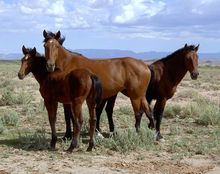On August 4, 2017, the United States Court of Appeals for the District of Columbia overturned a decision by the U.S. Forest Service (USFS) to cut the size of the habitat area for California’s largest remaining wild horse herd.

Wild horses in natural habitat
A precedent-setting victory makes clear that federal land management agencies cannot exclude federally protected wild horses or other key uses of public lands without grappling with the implications of such actions.
© 2017 by Kersti Nebelsiek
The court characterized as “arbitrary and capricious the USFS’ conclusion that its plan to remove 23,000 acres from the middle of the Devils Garden Wild Horse Territory in the Modoc National Forest had ‘no significant impact.’”
The Court found: The American Wild Horse Preservation Campaign and other plaintiffs filed suit alleging that the Service’s revamping of the territorial lines violated numerous federal laws.
We agree. A 23,000-acre tract of land and two decades of agency management cannot be swept under the rug as a mere administrative mistake. We accordingly reverse in part and remand for the Service to address rather than to ignore the relevant history.”
“This is a precedent-setting victory making clear that federal land management agencies cannot exclude federally protected wild horses or other key uses of public lands without grappling with the implications of such actions on the environment,” said William S. Eubanks II, of Meyer, Glitzenstein & Eubanks, who along with David Zaft, pro bono counsel for the Animal Legal Defense Fund, represented the American Wild Horse Campaign (AWHC), Return to Freedom and California citizen Carla Bowers in the appeal.
The appellate court’s decision overturns a district court decision to allow the USFS to eliminate tens of thousands of acres of critical wild horse territory and turn those lands over for use by private livestock grazing interests.
In its ruling, the DC Circuit further explained: “[T]he relevant environmental concern was the effect of the boundary modification on the wild horse population in the Devil’s Garden area.
The Service not only failed to address that concern, it denied its very existence. That head-in-the-sand approach to past agency practice is the antithesis of NEPA’s requirement that an agency’s environmental analysis candidly confront the relevant environmental concerns.”
On January 11, 2017, the DC circuit heard oral arguments in the case, in a hearing characterized as “favorable” by national media.
Devil’s Garden is officially designated as wild horse territory managed by the Forest Service (a division of the U.S. Department of Agriculture), which has been the homeland of wild horses since the 1800s.
In August 2013, the Forest Service authorized a decision that will eliminate more than 23,000 acres of prime wild horse territory and reduce the wild horse population by 80%–yet failed to study the impact of privately-owned cows and sheep who graze in the Devil’s Garden and outnumber wild horses by as much as eight times.
In 2016, the Forest Service began to implement its plan by removing more than 200 wild horses from Devil’s Garden Wild Horse Territory.
The Animal Legal Defense Fund was founded in 1979 with the unique mission of protecting the lives and advancing the interests of animals through the legal system. For more information, please visit aldf.org.
The American Wild Horse Campaign (formerly known as the American Wild Horse Preservation Campaign) is a national wild horse advocacy organization whose grassroots mission is endorsed by a coalition of more than 50 horse advocacy, public interest, and conservation organizations. AWHC is dedicated to preserving the American wild horse in viable, free-roaming herds for generations to come, as part of our national heritage.
Return to Freedom (RTF), is a national non-profit dedicated to wild horse preservation through sanctuary, education and conservation, and also operates the American Wild Horse Sanctuary in Lompoc, CA.
Meyer, Glitzenstein & Eubanks is the nation’s leading public interest law firm with offices in Washington, DC and Ft. Collins, Colorado.
The DC Circuit Court of Appeals decision can be found here.
